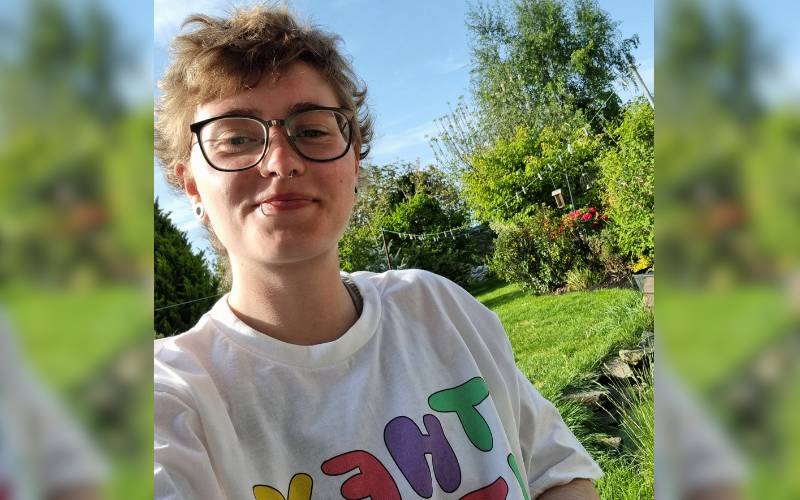
Breaking Barriers: Promoting Inclusivity and Support for Autistic Professionals
Interviews
Logan Thompson, a microbiologist at Organon, spoke to myGwork about their personal experience navigating life as an autistic individual. Logan highlights how autism affects their daily life, including sensory processing issues, difficulties with eye contact, and challenges in verbal communication. They also emphasize the importance of workplaces accepting and accommodating the varying needs and capabilities of individuals with disabilities, urging for understanding and flexibility.

Please introduce yourself and tell us about your role at your organization.
Hello, my name is Logan, I’m nonbinary aromantic and asexual, my pronouns are they/them. I teach and train in karate 3 times a week and love Lord of the Rings! I am a newby microbiologist at Organon and am looking forward to having fun in the micro lab.
Can you share a bit about your story with us?
I am 27 and have had an interesting journey finding myself and navigating life with autism, and some mental health conditions.
I’m autistic… so what does that really mean? Autism is a neurodevelopmental disorder that impacts the way the brain process information, situations and stimuli, as well as communication and behaviour. Autism is the operating system that runs my brain, I can’t separate autism from me, it’s literally who I am – and I’m proud to be autistic!
For me, autism shows up in several ways and impacts everything that I do. One way that autism affects my everyday life is the way that my brain processes auditory stimuli; noises that are loud or complex cause me physical pain, this is the same with visual stimuli which are too bright or cluttered. To help with these things I can wear ear defenders and sunglasses. My body also interoperates touch in a similar way – physical touch that is too light can be painful to me, this also means that some textures can make me incredibly uneasy and uncomfortable, while other textures make me super happy or calm. These sensory issues, alongside low latent inhibition, can often cause me to become overwhelmed at situations that others don’t have problems in, this can lead to meltdowns, shutdowns or burnout.
Eye contact for a lot of autistic people can be hard. It can be distracting, uncomfortable and even painful to look at eyes – I personally find that if I look at someone when they’re talking to me, I can’t really hear or tell what they’re saying. So, if I’m not looking at you, I’m not being rude, I’m actually paying more attention.
I am semi verbal, this means that for the most part I can communicate using verbal, spoken language. However, in some scenarios or when I am anxious or stressed, or even without reason, my ability to communicate verbally can become severely reduced and I become unable talk. This can be very frustrating and isolating; using Augmentative and Alternate Communication (AAC) can help me in these situations, or even using gestures, signs and echolalia too.
Echolalia is another prominent part of my autism. Echolalia is when someone repeats words, phrases or sounds that they have heard, this can help communication in a form of scripting, and can also be a way of stimming.
Stimming is the next big thing on my list, most autistic individuals stim, and even neurotypical/allistic people do too! Stimming is a vital part of my autism; it helps me regulate my emotions. I have different stims to help with different feelings. Rocking back and forth, flapping my hands and using fidgets are all ways that I stim. I also stim just because it feels natural to me. Alexithymia is the inability to recognise emotions, because I often find it hard to understand what I’m feeling I can get overwhelmed and confused, stimming can also help when I’m struggling with that too.
Social situations can also be super confusing and draining for autistic folks. For me, my autism makes it difficult, overwhelming and scary for me to socialise – trying to interpret what people say and do takes a lot of energy.
Being autistic also gives me some awesome abilities. I naturally notice small details that others miss, I’m very rule oriented and logical with tasks, and very, very happy with routines and planning, all of which makes me really good at organising and analysing things. Having autistic special interests is also pretty cool; for me I could quite happily watch, read and talk about Lord of the Rings all day.

How can workplaces show up for the disabled community?
Accept, take on and act on feedback from the disabled community. Understand that not every day is the same, some days can be better, and some days can be harder – for example, some days I can cope a lot better than others, this can mean that sometimes I can mask things better, and other times I can’t, or sometimes I am able to cope with situations when on other days those same tasks would use all of my energy.
What does allyship look like to you?
- Accepting me fully for who I am.
- Making accommodations.
- Allow me to unmask without being judged.
- Making me feel comfortable and not like a problem.
- Standing up for rights without having to be prompted.
- Correcting and advocating for disabled people, even when disabled people are not around.
- Stand up to ignorance e.g. correcting someone’s choice of words if they are negatively impacting or stereotyping a disorder or illness. i.e “I’m so OCD”, calling someone out and educating them around topics like this can help reduce stigma and can help peoples understanding of certain mental and physical disabilities.
What would you like to see more of from allies?
- An understanding of fluctuating needs.
- That alternate ways of communication are just as valid as verbal communication i.e. AAC
- Learning difficulties might make some things more difficult to do, but it doesn’t mean that the person can’t do things – it might just take a little longer, or they might need support. Offering support and not rushing people can help.
What does your workplace do to support you/people with disabilities?
- Daily check ins with the team are useful.
- Offer accommodations such as ear defenders/earplugs for those with sensory issues.
- Help reduce stigma around mental health issues, making it an easier and more comfortable place to be.
How can the hiring process be more inclusive of people with disabilities?
More pre-set and explained plans of how the process will go.
Access a timetable to see how the onboarding week is laid out. Having access to the overall structure of training i.e what is going to happen or be covered on each day, and if that if group work is involved, written work, presentations etc.
Having reassurance that having a disability will not impact on the hiring process would also be helpful.

Have you ever experienced discrimination? Would you feel comfortable sharing a bit about this?
Yes, I faced a lot of bullying and discrimination at school, college, university and in a previous place of work. Since joining Organon everyone has been amazing, so supportive and accommodating, which makes working and existing a whole lot easier, and I am very grateful!
Examples of discrimination I have experienced in the past:
During non-verbal episodes I have been ignored when using an AAC device. And in some cases, have been forced to use verbal communication in these times. This demanding and demeaning way of interacting is unfriendly, unaccepting, and being forced to use verbal communication can be distressing, painful, in some cases traumatic and can cause burnout and/or meltdowns.
I have also been berated and bullied for being autistic. Specifically, during times where I have been openly stimming or communicating through echolalia. I have been physically and mentally bullied for these things and have been asked to stop due to it being “attention seeking and distracting to others”. I have also been belittled for using accommodations and comfort items like cuddly toys.
In addition to this, I am often deliberately left out of groups, teamwork and conversation because of my communication and processing differences.
There have also been times where I have felt unsafe in workplaces due to my autism, having people make fun of me for not coping with sensory issues, and belittled for having special interests.
In relation to my other mental health difficulties, I have also faced discrimination in the workplace; being treated like a threat when disclosing diagnoses like psychosis and DPDR. This demonises people with mental health difficulties and perpetuates a dangerous stereotype that people with mental illnesses are unsafe to be around.
How can LGBTQ+ spaces be more inclusive of people with disabilities?
- Offer breakrooms, or if possible sensory rooms, that can allow people to go to if things get overwhelming.
- Having name and pronoun tags or badges can really help to take away some anxiety. Having options like she/they might also be more inclusive to those who use more than one pronoun.
- Not having too bright lights, or loud complex noises.
How can ERG’s/networks be inclusive of people with disabilities?
Allow people to unmask in a safe place without having to worry about people reactions or judgement, including allowing stimming, alternate communication methods and comfort items.
Offer a more open way of communicating how people should be approached. An example of this may be colour coded wrist bands that indicate how much people want to be approached or if they’d rather stay on their own in a safe place.
Don’t ask intrusive questions, if you wouldn’t ask an able-bodied person, it’s probably something you shouldn’t be asking a disabled person (this doesn’t apply to curious questions about disability – however, some people still might not be comfortable answering, please be mindful and respectful)
Don’t make assumptions based on one person – every person is different – even people with the same disability are likely to be different from one another.
Treat us like adults, infantilising us can be demeaning, condescending and, to be honest, a bit weird.
Check how the person likes to be addressed – some people prefer person first language; some people prefer identity first language. Using myself as an example: I am autistic, I am neurodivergent, I have mental illnesses – others may prefer: I have autism, I am a person with a disability, others may prefer: I am disabled. Check with the person, don’t assume.
Why do I want or need to advocate for autism? Autism is a disability that is often overlooked. It can come with many challenges that autistics try to hide or overcome (most of the time at the expense of their own physical and mental health). I want to spread awareness of how autism can affect people, and help neurotypical individuals learn how to best support and accept autistic people. Overall, my autism is what makes me me, I’m proud to be autistic. This is only the start of my advocacy journey and there is so much more to say about autism, I would love to keep educating.

